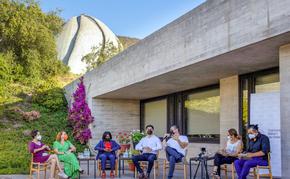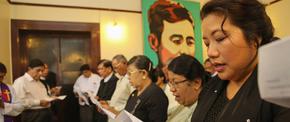The views expressed in our content reflect individual perspectives and do not represent the authoritative views of the Baha'i Faith.
As the first anniversary of the Paris attacks passes, one might almost despair to think that subsequent acts of terror in Orlando and in Nice, not to mention the full scale war that still rages in Syria, have served to amplify the sense of horror the world felt at this time last year. How do we respond to repeated acts of violence perpetrated in the name of hatred? How can we keep alive the flame of hope for a more peaceful world?
I remember the example of Abdul-Baha, who traveled to Paris in the early years of the twentieth century as the world teetered on the brink of war. He came in the twilight of his years and in frail health, after spending forty years in prison for his Faith. He spoke little English, less French, and relied on a translator to communicate. He stayed for nine weeks in an apartment on the Avenue de Camoens, not far from the Eiffel Tower. In a talk he gave there in October of 1911 to a room filled with people of diverse faiths, races, and classes, he gave hope to everyone present when he spoke these words:
I charge you all that each one of you concentrate all the thoughts of your heart on love and unity. When a thought of war comes, oppose it by a stronger thought of peace. A thought of hatred must be destroyed by a more powerful thought of love. Thoughts of war bring destruction of all harmony, well-being, restfulness and content. Thoughts of love are constructive of brotherhood, peace, friendship, and happiness….If you desire with all your heart, friendship with every race on earth, your thought, spiritual and positive, will spread; it will become the desire of others, growing stronger and stronger, until it reaches the minds of all men. – Paris Talks, pp. 29-30.
Persecuted all his life by Muslim clergy and officials, including the Shah of Iran, Abdul-Baha knew what he was talking about. At the age of eight, he was stoned by a group of Muslim children when his mother sent him out to get food for the family. That same year, Iran’s Muslim clerics persuaded the Shah to send the boy’s family into exile. He walked through the mountains of Iraq in the middle of winter and suffered from the effects of frostbite for the rest of his life. But he did not return hatred with hate. For Abdu’l-Baha, forgiveness did not mean merely turning the other cheek to receive another blow. Forgiveness meant inner transformation, using the mind to extinguish the negative feelings of the heart. It meant consciously mastering hate.
Abdul-Baha came to Paris to offer a path to peace, and all those who gathered in the apartment on the Rue De Camoens basked in the light of words that affirmed the oneness of all religions in a progressive revelation of truths delivered to different societies at different times in history. As Abdul-Baha made clear in many of his Paris talks, those revelations included Islam, whose clerics had executed Baha’is by the thousands precisely because of their belief that God had sent and would continue to send divine teachers to educate humanity, even after Muhammad.
On these dark days of mourning and bewilderment at the condition of our fragile planet and its people, I hold fast to Abdul-Baha’s words and call them to mind whenever I feel inclined to despair over acts perpetrated in the name of hate.
In the aftermath of such vicious acts of murder and terror as we have witnessed in the past year, let us not succumb to fear and hatred. Let us hate these acts, but achieve mastery over that knee-jerk, gut level response that tells us to strike back in hatred at those whose hearts have been overcome by hate.
In these dark times, the words Abdu’l-Baha spoke in that apartment in Paris a little over a hundred years ago, words that brought light in another dark time, offer us not only a way to conquer hate, but a path towards a firm and enduring peace, a peace founded on an awareness of a truth that seems, to many, so painfully self-evident: we all belong to one people—the human race.

















Comments
Sign in or create an account
Continue with Facebookor